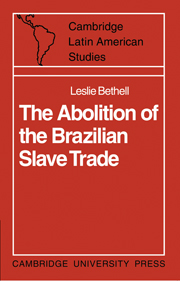Book contents
- Frontmatter
- Contents
- Preface
- Maps
- Abbreviations
- 1 First steps towards abolition, 1807–1822
- 2 Independence and abolition, 1822–1826
- 3 Brazil and the slave trade, 1827–1839
- 4 Treaty negotiations, 1830–1839
- 5 The British navy and the mixed commissions, 1830–1839
- 6 The extension of Britain's powers, 1839
- 7 Britain and the slave trade, 1839–1845
- 8 Slave trade, slavery and sugar duties, 1839–1844
- 9 Lord Aberdeen's Act of 1845
- 10 The aftermath of the Aberdeen Act
- 11 Changing attitudes and plans of action, 1845–1850
- 12 Crisis and final abolition, 1850–1851
- 13 The aftermath of abolition
- Appendix: Estimates of slaves imported into Brazil, 1831–1855
- Bibliography
- Index
6 - The extension of Britain's powers, 1839
Published online by Cambridge University Press: 04 August 2010
- Frontmatter
- Contents
- Preface
- Maps
- Abbreviations
- 1 First steps towards abolition, 1807–1822
- 2 Independence and abolition, 1822–1826
- 3 Brazil and the slave trade, 1827–1839
- 4 Treaty negotiations, 1830–1839
- 5 The British navy and the mixed commissions, 1830–1839
- 6 The extension of Britain's powers, 1839
- 7 Britain and the slave trade, 1839–1845
- 8 Slave trade, slavery and sugar duties, 1839–1844
- 9 Lord Aberdeen's Act of 1845
- 10 The aftermath of the Aberdeen Act
- 11 Changing attitudes and plans of action, 1845–1850
- 12 Crisis and final abolition, 1850–1851
- 13 The aftermath of abolition
- Appendix: Estimates of slaves imported into Brazil, 1831–1855
- Bibliography
- Index
Summary
By the late 1830s the failure of Britain's efforts to contain, much less to suppress, the illegal transatlantic slave trade—the Cuban trade as well as the Brazilian continued to flourish—was causing increasing concern amongst English abolitionists. Many were coming round to the view, frequently expressed by diplomats, commissioners and naval officers directly concerned with improving and implementing the anti-slave trade treaties, that Britain would soon have to resort to more drastic measures, if necessary without the consent of the three major offenders, Portugal, Spain and Brazil. Lord Brougham, for instance, addressing the House of Lords in January 1838, expressed the hope that the final suppression of the trade would be the earliest and most enduring glory of Queen Victoria's reign. For how much longer, he asked, with heavy irony, would Britain continue to ‘pause and falter, and blanch and quail before the ancient and consecrated monarchy of Brazil, the awful might of Portugal, the compact, consolidated, overwhelming power of Spain' while Africa was ravaged? When on 10 May 1838, for the first time in three years, the Commons debated the slave trade question, a motion demanding that greater pressure should be brought to bear on foreign powers, and especially on Portugal, found support on both sides of the House and was carried without a division.
- Type
- Chapter
- Information
- The Abolition of the Brazilian Slave TradeBritain, Brazil and the Slave Trade Question, pp. 151 - 179Publisher: Cambridge University PressPrint publication year: 1970



